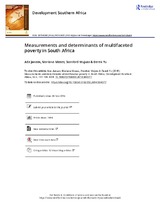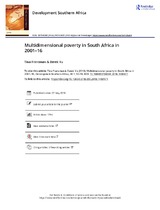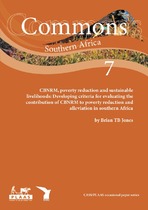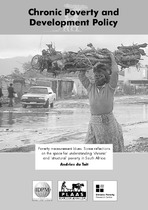Measurements and determinants of multifaceted poverty in South Africa
| dc.contributor.author | Jansen, Ada | |
| dc.contributor.author | Moses, Mariana | |
| dc.contributor.author | Mujuta, Stanford | |
| dc.date.accessioned | 2021-09-08T16:16:59Z | |
| dc.date.available | 2021-09-08T16:16:59Z | |
| dc.date.issued | 2015 | |
| dc.identifier.citation | Jansen, A. et al. (2015). Measurements and determinants of multifaceted poverty in South Africa. Development Southern Africa, 32(2),151-169. http://dx.doi.org/10.1080/0376835X.2014.984377 | en_US |
| dc.identifier.issn | 1470-3637 | |
| dc.identifier.uri | https://doi.org/10.1080/0376835X.2014.984377 | |
| dc.identifier.uri | http://hdl.handle.net/10566/6634 | |
| dc.description.abstract | Poverty, despite being a multifaceted concept, is commonly measured in either absolute or relative monetary terms. However, it can also be measured subjectively, as people form perceptions on their relative income, welfare and life satisfaction. This is the first study that uses the National Income Dynamics Study data to analyse poverty across various objective and subjective methods. The paper finds that while respondents’ poverty status varies across methods, blacks remain the racial group most likely to be defined as poor by at least one method. The multivariate analysis reveals that the impact of some explanatory variables, such as experience of negative events, frequency of crime victimisation, health status and importance of religious activities, is mixed across methods. | en_US |
| dc.language.iso | en | en_US |
| dc.publisher | Routledge | en_US |
| dc.subject | Poverty | en_US |
| dc.subject | Objective poverty | en_US |
| dc.subject | Relative poverty | en_US |
| dc.subject | Absolute poverty | en_US |
| dc.subject | South Africa | en_US |
| dc.title | Measurements and determinants of multifaceted poverty in South Africa | en_US |
| dc.type | Article | en_US |




